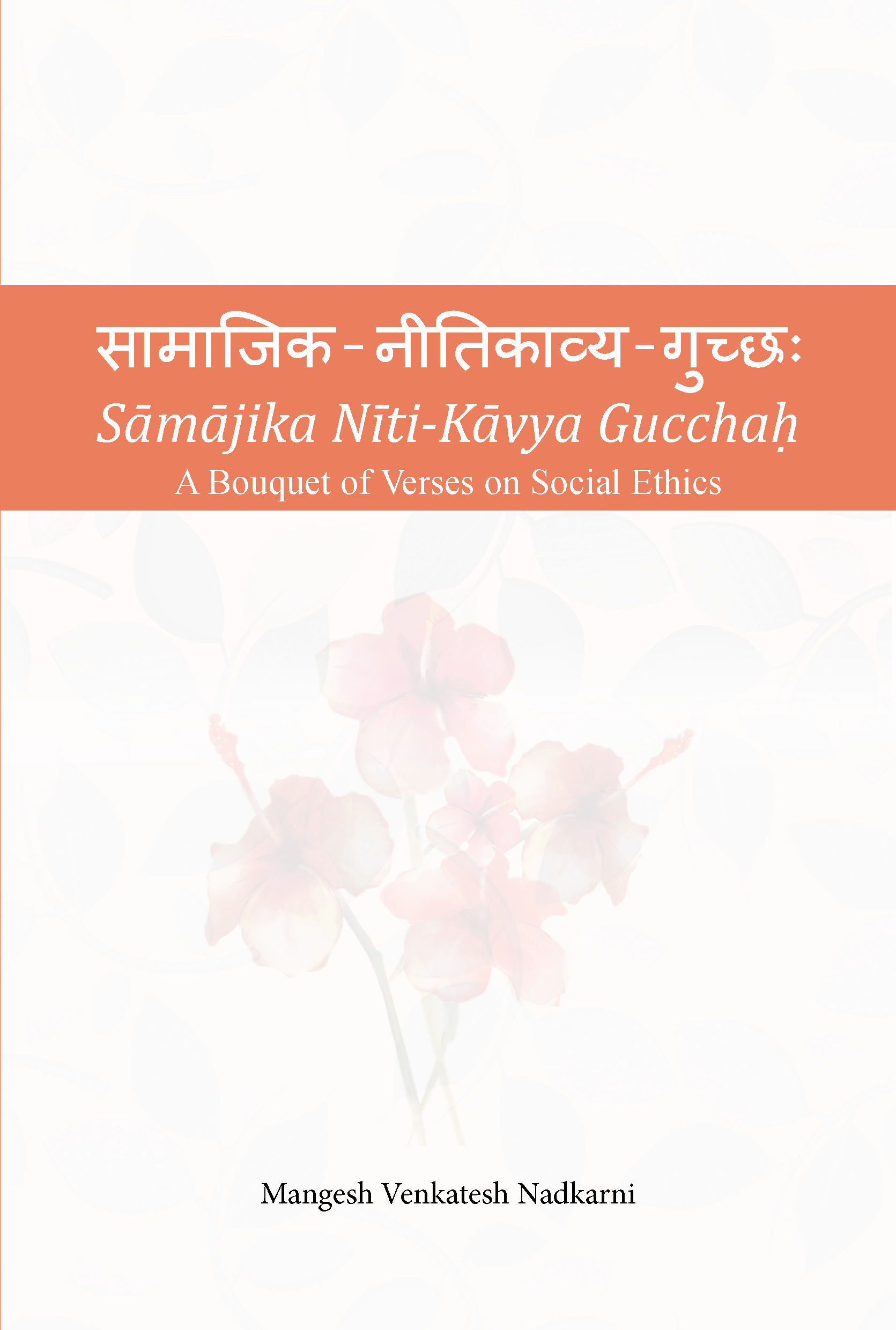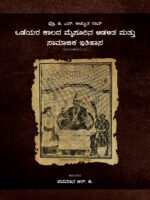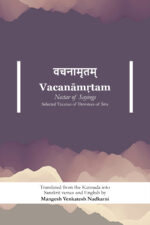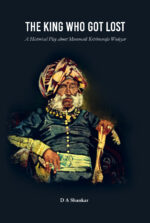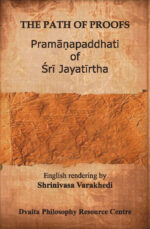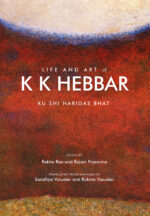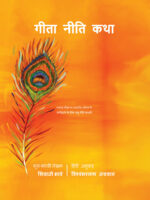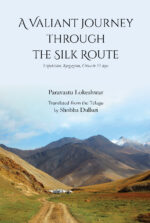Saamaajika Neeti Kaavya Gucchah
₹395.00
Author: M V Nadkarni
The book Samajika Niti-Kavya Gucchah contains five satakams (sets of hundred verses) on social ethics, inspired by the ancient Sanskrit poet, Bhartrhar’s Niti-satakam. They are on environmental ethics, Gandhi’s ethical philosophy, Hinduism from the ethical perspective of Gandhi, humanitarianism, and ethical philosophy of democracy including human rights. There are also two dasakams (sets of ten verses), being prayers to goddess Sharada and goddess Mahalakshmi, one at the beginning and the other at the end of the satakams, respectively; seeking wisdom and end to poverty and inequality in the world. Though the original compositions are in Sanskrit, the book provides their lucid translation into English with word-to-word meaning and annotation.
The book is a short but comprehensive introduction to social, political, economic, and environmental ethics, and can be an aid in learning Sanskrit through modern problems showing the language as relevant for contemporary concerns as well.
Interested customers may write to us at mup@manipal.edu about purchasing the book.
| Also available on |
| Category: | Texts in Translation |
|---|
| Author | |
|---|---|
| Format |
Related products
-
Wodeyara Kaalada Mysurina Adalitha matthu Saamajika Ithihasa
₹600.00Author: Pavamana R D, D S Achuta Rao
ವಿಜಯನಗರ ಸಾಮ್ರಾಜ್ಯದ ಉತ್ತರಾಧಿಕಾರಿಗಳೆಂದು ಹೆಸರಾಗಿರುವ ಮೈಸೂರಿನ ಒಡೆಯರು ಕರ್ನಾಟಕದ ಇತಿಹಾಸಕ್ಕೆ ನೀಡಿದ ಕೊಡುಗೆ ಅನನ್ಯವಾದುದು. ರಾಜಕೀಯ ರಂಗದಲ್ಲಿ ಮಾತ್ರವಲ್ಲದೆ, ಸಾಂಸ್ಕೃತಿಕ, ಸಾಹಿತ್ಯಿಕ ಹಾಗೂ ಕಲಾರಂಗಗಳಲ್ಲೂ ಮೈಸೂರು ಅರಸರು ವಿಜಯನಗರದ ಶ್ರೇಷ್ಠ ಪರಂಪರೆಯನ್ನು ಮುಂದುವರೆಸಿದರು. ರಾಜಒಡೆಯರ್, ರಣಧೀರ ಕಂಠೀರವ, ಚಿಕ್ಕದೇವರಾಜ ಒಡೆಯರ್ ಅವರ ಆಳ್ವಿಕೆಯ ಕಾಲಘಟ್ಟದಲ್ಲಿ ಮೈಸೂರು ಸರ್ವಾಂಗೀಣ ಪ್ರಗತಿ ಸಾಧಿಸಿತು. ಈ ವಂಶದ ಮೊದಲ ಪ್ರಮುಖ ಅರಸು ರಾಜ ಒಡೆಯರ್ರಿಂದ ಆರಂಭಿಸಿ ಮೈಸೂರು ಆಂಗ್ಲರ ಅಧೀನವಾಗುವವರೆಗಿನ ಆಡಳಿತ ಹಾಗೂ ಸಾಮಾಜಿಕ ಇತಿಹಾಸ ಇಲ್ಲಿದೆ. ಮೈಸೂರು ಸಂಸ್ಥಾನದ ಎರಡು ಮಹತ್ವಪೂರ್ಣ ಶತಮಾನಗಳ ಕಾಲದ ಆಡಳಿತ, ಕಂದಾಯ ನೀತಿಗಳು, ನ್ಯಾಯಾಡಳಿತ, ಸೈನ್ಯ ವ್ಯವಸ್ಥೆ, ಪ್ರಾಂತೀಯ ಹಾಗೂ ಸ್ಥಳೀಯ ಆಡಳಿತ, ಸಾಮಾಜಿಕ ಜೀವನ ಹಾಗೂ ಧರ್ಮ, ಶಿಕ್ಷಣ, ಸಾಹಿತ್ಯ, ಕಲೆ ಮತ್ತು ವಾಸ್ತುಶಿಲ್ಪ ಮತ್ತು ಆಸ್ಥಾನ ಸಂಸ್ಕೃತಿ ಹೀಗೆ ಬಹುಮುಖೀ ನೆಲೆಗಳ ವಿಸ್ತಾರವಾದ, ಅಧ್ಯಯನಪೂರ್ಣ ಸಂಶೋಧನಾ ವರದಿಯಾಗಿ ಇದು ಸ್ವಾತಂತ್ರೋತ್ತರ ತಲೆಮಾರಿನ ವಿದ್ವಾಂಸರ ಸಂಶೋಧನಾ ವೈಖರಿಗೆ ಒಂದು ಅತ್ಯುತ್ತಮ ಉದಾಹರಣೆ ಎನ್ನಬಹುದು. ಕರ್ನಾಟಕದ ಅದರಲ್ಲೂ ಮೈಸೂರಿನ ಒಡೆಯರ ಇತಿಹಾಸದ ಬಗೆಗೆ ಸಂಶೋಧನೆಗಳು ಇನ್ನೂ ಕಣ್ತೆರೆಯುತ್ತಿದ್ದ ಕಾಲದಲ್ಲಿ ಡಿ. ಎಸ್. ಅಚ್ಯುತರಾಯರ ಈ ಸಂಶೋಧನ ಕಾರ್ಯ ಮಹತ್ವಪೂರ್ಣವಾದುದು. ಅಂದಿಗೆ ಲಭ್ಯವಿದ್ದ ಎಲ್ಲಾ ಬಗೆಯ ಮೂಲ ಹಾಗೂ ಆನುಷಂಗೀಕ ಆಕರಗಳನ್ನು ಬಳಸಿಕೊಂಡು, ಸಂಶೋಧನೆಯ ಎಲ್ಲಾ ಚೌಕಟ್ಟಿನೊಳಗೆ ವಸ್ತುನಿಷ್ಠವಾಗಿ ರೂಫುಗೊಂಡಿದೆ ಈ ಕೃತಿ. ಸಾಮಾಜಿಕ ಇತಿಹಾಸವನ್ನು ಪುನರ್ ರೂಪಿಸುವಾಗಲಂತೂ ಸಮಕಾಲೀನ ಸಾಹಿತ್ಯದ ಎಲ್ಲಾ ರೂಪಗಳನ್ನೂ ಇಲ್ಲಿ ಬಳಸಿಕೊಳ್ಳಲಾಗಿದೆ. ಅಗತ್ಯ ವಿರುವೆಡೆಯಲ್ಲಿ ಒಂದಕ್ಕಿಂತ ಹೆಚ್ಚಿನ ಸಂಖ್ಯೆಯಲ್ಲಿನ ಉಲ್ಲೇಖಗಳು, ಟಿಪ್ಪಣಿಗಳೂ, ವಿವರಣೆಗಳೂ ಈ ಸಂಶೋಧನೆಯ ಮೌಲ್ಯವನ್ನು ಹೆಚ್ಚಿಸಿವೆ. ಸಂಶೋಧನೆಗೆ ಪೂರಕವಾಗಿ ಗ್ರಂಥಋಣ, ನಕ್ಷೆಗಳು, ಸಂಕ್ಷೇಪಾಕ್ಷರಗಳು ಹಾಗೂ ಒಡೆಯರ ವಂಶಾವಳಿ ನೀಡಲಾಗಿದೆ. ಆಧಾರಗಳ ಮೇಲಿನ ಟಿಪ್ಪಣಿಯು ಸಂಶೋಧಕರಿಗೆ ತಮ್ಮ ಕಾರ್ಯಕ್ಷೇತ್ರದ ಮೇಲಿನ ಒಡೆತನದ ದ್ಯೋತಕ. ಅಪಾರ ಸಂಖ್ಯೆಯ ಹಸ್ತಪ್ರತಿಗಳ ಮತ್ತು ಶಾಸನಗಳ ಬಳಕೆ ಈ ಕೃತಿಯ ಹೆಗ್ಗಳಿಕೆ.
Interested readers may write to us at mup@manipal.edu about purchasing the book.
-
Vacanāmṛtam – Nectar of Sayings
₹600.00Translator : Mangesh Venkatesh Nadkarni
The Śiva Śaraṇas of medieval Karnataka left a rich legacy of what are called Vacanas, or “Sayings,” in Kannada. These Vacanas were far ahead of their times in social awareness. They deplored the caste system and discrimination, upheld the dignity of women in family and society, stressed on the priority of work, and advocated charity, in addition to devotion to One God – Śiva. They also imparted practical wisdom for living honourably and meaningfully in the world.
Though the book is primarily meant for those who do not understand the original in Kannada, Kannadigas can also benefit from it. This is because the most interesting (320) of the vast number of Vacanas (more than 20,000) are selected and made accessible in one place here. The translations here are not literal or mechanical. They bring out the intent of the Vacanas while being truthful to the original at the same time.
Manipal Universal Press (MUP) is dedicated to making Vacana Sahitya accessible to the English audience. As a part of this effort, we have published a book titled Akka Mahadevi: The Questioning Poet-Saint. This work explores the life and enduring legacy of Akka Mahadevi, the influential 12th Century Kannada poet whose profound vacanas continue to inspire readers today.
Interested customers may write to us at mup@manipal.edu about purchasing the book.
Also available on

-
The King Who Got Lost: A Historical Play about Mummadi Krishnaraja Wodeyar
₹200.00Young Mummadi, put on the throne by the British after the last Mysore war in 1799, was brought up under the watchful guidance of the far-sighted and shrewd Dowager Maharani Lakshmammanni. After falling into the hands of the powerful and politically experienced Dewan Purnaiah, he had a tortuous and tortured life. The young prince was never able to outgrow the influence of two of these mentors. To add to this, Mummadi, fell prey to an easy and rather voluptuous life. He was married but in addition to his many wedded consorts, he was caught in the spying and quarrelsome domestic life. Mummadi could never, despite valiant efforts, free himself and grow into a self-confident king.
The pressures of the ruthless British administration and the local, disruptive, and rebellious chieftains made Mummadi’s life a sad, tragic tale bordering on the ridiculous and the pathetic.
Interested overseas customers may write to us at mup@manipal.edu about purchasing the book.
-
The Path of Proofs – Pramanapaddhati of Sri Jayatirtha
₹250.00The Path of Proofs: Pramanapaddhati of Sri Jayatirtha Epistemology of the Dvaita school of thought is presented in this short monograph Pramanapaddhati the Path of Proofs, authored by Sri Jayatirtha. Epistemology is the science of knowledge that deals with the origin and nature of cognitive events and their means. Acarya Madhva, the proponent of the Dvaita school, has explained about the epistemology of this new school in his works. Since Madhva’s language is profound and the elucidations are scattered over his several works, it is difficult to comprehend for a novice. Hence, Pramanapaddhati was composed by his successor of third generation Sri Jayatirtha. The simple and captivating style of this work is sure to ignite the interest in the readers to conduct further study in detail. This work is not only regarded as a standard textbook of Dvaita studies, but also considered as a basic authentic work in the Dvaita dialectic literature. The work is classified into three chapters; Pratyaksa, Anumana and Agama as a compendious yet full treatment of the Dvaita epistemology in smaller captions. Its discussion on the standpoints of other schools on various topics and their criticism is not much detailed. However, it is systematized and presented in an easily comprehendible style that can make even a novice understand the intricacies of Dvaita epistemology. The unique commentary skill of Sri Jayatirtha comprises of profound scholarship, style of exposition, lucid language, commitment to the original author, views on opposition with thorough knowledge, logical integrity, appropriate and comprehensive method of thinking. This work is rendered into English by Prof Shrinivasa Varakhedi adopting the mirror-translation method.
-
Life and Art of K K Hebbar
₹2,000.00Author: Haridas Bhat Editors: Rekha Rao, Rajani Prasanna Translators: Sandhya Vasudev, Rukma Vasudev
K K Hebbar was a trailblazer in Indian art. His contributions to modern Indian art as an artist, teacher, and art administrator are unparalleled. What is ‘Indian’ in modern Indian art has been a subject of discussion since the beginning of the modernist movement. Hebbar’s oeuvre is an answer to that question. It is modern and yet, intensely Indian, both in terms of subjects and treatment. Hebbar remained rooted in his native soil. His line drawings are a treasure of Indian art. No one has surpassed them in their delicacy and lyricism.
This biography is Mr Bhat’s affectionate account of his friend Hebbar’s life and art. The strength of Hebbar’s character comes through in his narration. Integrity and self-discipline were Hebbar’s defining qualities. Arguably, the man was greater than his work. And that makes his story intriguing. This biography of a major artist is a welcome addition to the meagre literature on Indian artists.
Interested customers may write to us at mup@manipal.edu about purchasing the book.
Also available on

-
Geeta Niti Katha
₹850.00Author: Shivaji Bhave, Translator: Vishambharnath Agarwal
यह पुस्तक भगवद् गीता के प्रत्येक श्लोक पर आधारित लघुकथाओं का संकलन है। ये कथाएँ श्री शिवाजी भावे (आचार्य विनोबा भावे के छोटे भाई) ने 1950 के दशक में मराठी में लिखी। इन कथाओं की परम्परा पंचतंत्र और Aesop’s Fables से शुरू होती है।
कथाएँ बहुत ही रोचक और सरल हैं एवं गीता के गहन विषय को सुगमता से समझने में सहायक भी। जीवन के मूल्यों को बहुत ही सरल भाषा में समझाती है जिससे बच्चे बूढ़े और युवा सभी कुछ न कुछ ग्रहण कर सकते हैं।
Interested customers may write to us at mup@manipal.edu about purchasing the book.
-
A Valiant Journey Through the Silk Route
₹575.00Author: Paravastu Lokeshwar, Translator: Shobha Dulluri
A Valiant Journey through the Silk Route is a travelogue that covers the incredible travel across the ancient Silk Route with the most alluring halts in Uzbekistan, Kyrgyzstan, and China to achieve a lifetime dream of a vagabond. The journey that starts in New Delhi and ends in Beijing opens up new vistas that are fascinating. The route covers historical monuments, museums, ancient oases, cemeteries, rural settings, public marketplaces, and several other landmarks and attractions. The travel continues through the deserts, passes by the rivers, treks up on the mountainous terrains – the path through which the great ancient travellers trudged.
Interested customers may write to us at mup@manipal.edu about purchasing the book.
Also available on

-
Saga of The Uprooted
₹95.00Author: Ranga Hari, Translator: Saratchandra Shenoi
This English translation of Visthapanachi Katha, a Konkani Khanda Kavya, depicts the saga of the migration of the Konkani community from Goa to a land far away from home. This collection of poems encapsulates the reign of a colonial power over the region of Goa that began with the entry of the Portuguese in the 16th century. It illustrates the displacement of the Konkani people and their resurgence at Cochin port. The poems describe the transformation of Goa – both culturally and topographically – and the people of Goa who were plundered, displaced, uprooted, and were forced to strip off their culture and identity. The poet is unfolding the tale of his very own ancestors by tracing out these events and graphically portraying the plight of the Konkani people. Saratchandra Shenoi, the author of this English translation, is a multilingual translator and a Sahitya Akademi Award winning (Antarnad – 1999) Konkani poet based in Kochi. He has over twenty books to his credit which include collections of poetry, works of fiction and non-fiction, translations, edited anthologies and language guides. Ranga Hari is the author of the Konkani original text titled Visthapanachi Katha. He has written more than twenty-five books in different languages, and was associated with Bharatiya Sikshan Mandal and Vidya Bharati.
Interested readers may write to us at mup@manipal.edu about purchasing the book.

